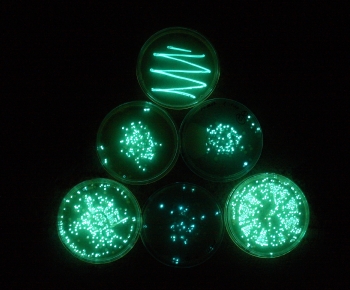| | 02 September, 2012
| | Glow and be eaten – marine bacteria use light to lure plankton and fish | | ‘Survival of the brightest’ |
 | | Glowing deep-sea bacteria |
|
Not all that glitters is gold. Sometimes it is just bacteria trying to get ahead in life.
Many sea creatures glow with a biologically produced light. This phenomenon, known as bioluminescence, is observed, among others, in some marine bacteria which emit a steady light once they have reached a certain level of concentration (a phenomenon called “quorum sensing”) on organic particles in ocean waters.
Though this was a known occurrence, the benefits of producing light remained unclear.
Now, in an article published recently in the Proceedings of the National Academy of Sciences of the USA (PNAS), researchers of the Hebrew University of Jerusalem have unraveled the mystery of why the marine bacteria glow. It has to do with what might be called “the survival of the brightest.”
The article is based on the research carried out at the Interuniversity Institute for Marine Sciences in Eilat by graduate student Margarita Zarubin, under the supervision of Prof. Amatzia Genin, the head of the Department of Evolution, Systematics and Ecology at the Hebrew University of Jerusalem, in collaboration with Prof. Shimshon Belkin and his student Michael Ionescu of the Hebrew University’s Silberman Institute of Life Sciences.
Their findings show that the light emitted by the bacteria attracts predators, generally zooplankton, which ingest the bacteria but are unable to digest them. The bacteria, which continue to glow inside the zooplankton’s guts, reveal the presence of the now-glowing zooplankton, which in turn, are attacked by their own predators – fish -- who can spot them readily in the dark.
In experiments conducted by the researchers in total darkness, they found that nocturnal fish were easily able to detect the glowing zooplankton and eat them, while, on the other hand, the fish were not attracted to zooplankton that had swallowed bacteria that had undergone genetic mutation and thus did not glow.
Further investigation of nocturnal fish that had fed on zooplankton showed that the luminous bacteria also survived the passage through the fish guts. “As far as the bacteria are concerned, their access to the fish digestive systems is like reaching ‘paradise’ – a safe place, full of nutrients, and also a means of transport into the wide ocean,” explained Prof. Genin.
On the other hand, the finding that some zooplankton are attracted to the glow of the bacteria and consume the luminous matter seems to be in contradiction to their own survival instincts, since it increases the chances of the zooplankton being attacked and eaten by fish. The phenomenon of quorum sensing that regulates bacterial bioluminescence can explain this finding, say the researchers. The zooplankton “know” that a light in the water indicates the presence of a rich presence of organic material on which the bacteria grow.
“In the dark, deep ocean the quantity of food is very limited, therefore it is worthwhile for the zooplankton to take the risk of becoming glowing themselves when contacting and consuming the particle with glowing bacteria, since the profit of finding rare food there is greater than the danger of exposing themselves to the relatively rare presence of predatory fish,” explained Prof. Genin.
|
|


